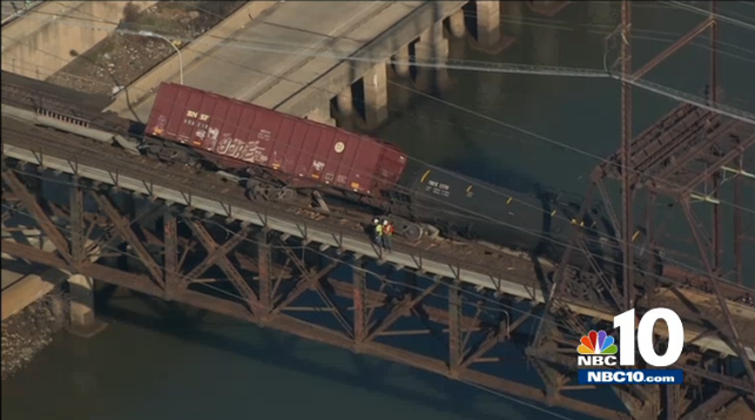Freight cars carrying oil, sand derailed above Schuylkill River

Overnight a freight train traveling between Chicago and Philadelphia derailed on the Schuylkill Arsenal Railroad Bridge, between the South Street and University Avenue bridges.
CSX spokesman Gary Sease told NBC10 that seven cars derailed, though the cause is not yet known. Of the seven derailed cars, six contained crude oil and one contained sand, philly.com reports.
This morning a tanker car and a boxcar remain teetering on the century-old bridge over the river, between Penn’s riverfront athletic fields and the Veolia plant. The freight train’s other 99 cars have been moved out of the way. The Coast Guard has set up a safety zone in the river and is monitoring for pollution along with local emergency responders. Thus far no leaks have been detected.
Live look at derailed train cars via NBC10:
This derailment, which fortunately has not yet resulted in a spill, illustrates part of the risk that comes with increased freight rail traffic through cities, particularly when it comes to transporting crude oil from the Midwest to refining centers like Philadelphia Energy Solutions (the former Sunoco refinery) in South Philadelphia.
Pipeline infrastructure hasn’t kept pace with oil exploration in North America so more Bakken crude oil is traveling by rail. And that might not be such good news for cities. But recent explosions in Canada and North Dakota have prompted federal regulators and rail companies to strike a deal to make sure Bakken crude rail shipments are safer. Going forward energy companies will have to disclose the content of crude oil and the government will study routing trains around high-risk areas and develop reduced speed areas for safety.
Read more:
- Rail, oil industries weigh new safety measures in wake of derailments, explosions [NBCNews.com, 1/17/14]
- Bakken Crude Oil Rail Shipments Concern Federal Regulators [International Business Times, 1/17/14]
- An explosive situation? [Daily News, 12/11/13]
- A Petaled Rose of Hell: Refineries, Fire Risk, New Geography of Oil in Philadelphia’s Tidewater [Hidden City Daily, 12/10/13]
WHYY is your source for fact-based, in-depth journalism and information. As a nonprofit organization, we rely on financial support from readers like you. Please give today.





